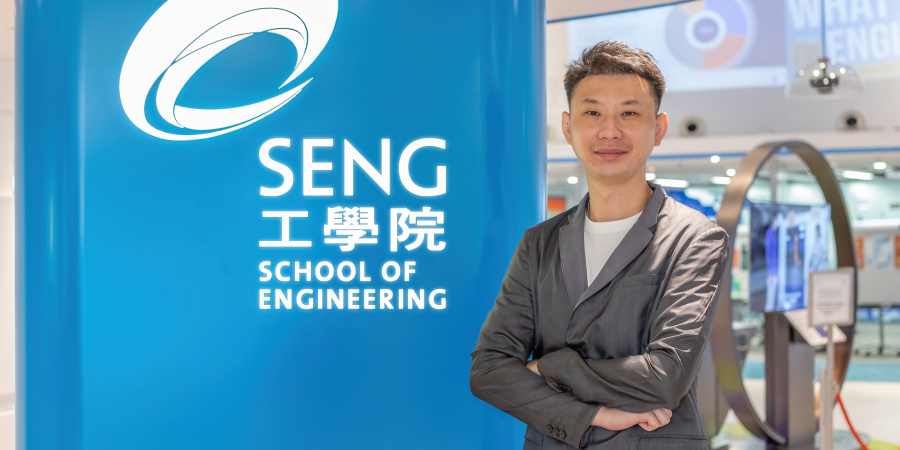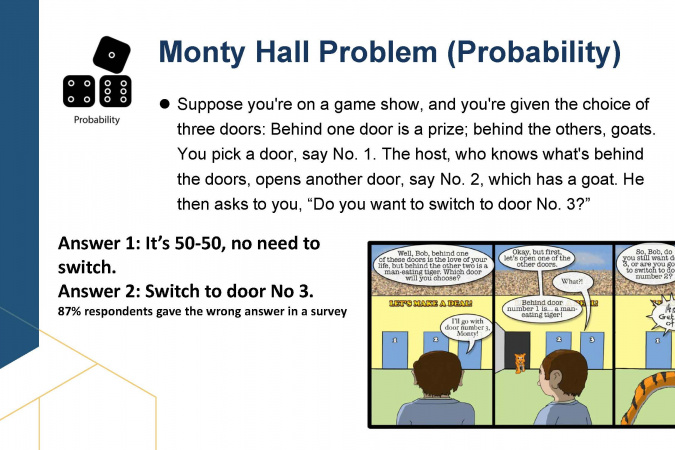It’s a Numbers Game
Having dreamed of working in the gaming industry from a young age, Prof. Kenneth LEUNG, Assistant Professor of Engineering Education at HKUST’s School of Engineering, never thought he would become a professor one day, let alone winning a teaching award.
“I was quite a bad student until I went to college,” recounts the winner of the HKUST Common Core Teaching Excellence Award 2021. “But then I discovered an interest in computer science and continued my studies in the graduate level. Before I realized, I became a teaching assistant (TA), and now, a professor at HKUST where I got my PhD.”
Expectations met reality
The winning course he teaches – COMP 2711 Discrete Mathematical Tools for Computer Science – simply put, deals with probabilities, graph theory, and theory of computation.
When he first started teaching, Prof. Leung tried to follow what his professors did, but it did not work quite well with students 10 years younger than him.
“When I was a student, there were no powerpoint slides, no videos, and no teaching aid,” Prof. Leung recalls. “We did not even have time to ask questions because we could not even finish copying the notes! When I tried to adopt the same teaching methods in my first classes, I was shocked by how disinterested my students were. I knew something had to change.”
Soon, Prof. Leung ditched his ineffective teaching strategies and began each lesson with questions that challenged the younger minds.
“We call it the ‘try-it-before-explain’ approach, where we would give students classic questions such as the Monty Hall problem and Knights and Knaves, or real-life math problems like counting related to poker and Mark Six probabilities where students would find that logic and probability are not only textbook learning, but useful tools in everyday life,” Prof. Leung says. “These teaser questions intrigued the younger generation, and we then further challenged them to come out with their own as part of their assignments.”
Two games at a time
Traditionally, students were assigned with problems, solved them and turned in their answers for marking. But that too did not work well when the TAs found that some students studied past papers and simply copied all the answers. Prof. Leung and his team then created a gamifying platform with assistance from the Center for Education Innovation (CEI), where students would be asked to form their own questions to their peers.
With financial aid from CEI, Prof. Leung and his team created Gforum, a gaming portal where students in his class would be able to join in a quest for glory by uploading their questions to the game. Each student would then be tasked to answer five randomly selected questions from the pool, and they will get to play this game twice a term as their assignments.
“Ever since we introduced this exercise, we would always have plenty of new, refreshing math questions floating in classroom discussions,” Prof. Leung says. “The best part is that when students play the role of a question creator, they actually have to apply formulas and theories they learnt in order to convince both themselves and the target audience. This rigorous intellectual exercise has reinforced their level of mastery significantly.”
Next, Prof. Leung set out to look for ways to reach out to students more effectively. “When students were asking for more problems, we decided to create a Telegram group, where students are all welcome to share their questions and answers anonymously or under an alias. This has ensured a high level of engagement – students would be more inclined to raise questions if they know they don’t have to post their real names in a discussion.”
As an exemplary model for making complex concepts understandable and enjoyable, Prof. Leung’s innovative pedagogy and the hard work he puts into creating an engaging learning environment and stimulating students’ curiosity have earned him the Common Core Teaching Excellence Award 2021.
Stay young and have fun
From creating Gforum, using Telegram, and also hosting classes in Coursera, Prof. Leung found that he too has to push himself constantly to find ways to keep up with times.
“I play video games, I watch hit TV shows such as Squid Games, and I make sure that I am well-versed in the latest tech in the market,” Prof. Leung says. “Knowledge comes in many forms, but what good is it if I cannot pass it on? We too as educators have to stay young and keep evolving in our pedagogies.”
Prof. Leung’s willingness to connect has made him a well-respected figure among students at HKUST, not just as a professor, but also as a friend.
“As educators, we touch lives in more ways we recognize ourselves sometimes,” Prof. Leung notes. “I would receive letters from past students thanking me for my advice and, sometimes, a word of encouragement that I don’t even remember. But that did not matter – what matters is our words reached them, and a bond was formed.
“Do what you like and what interests you” may sound like a cliché to many. For Prof. Leung, he has taken the advice to his heart, and so have his students.
“Stay young, have fun, and get more done – that’s how my passion for computer science has taken me to where I am now,” concludes Prof. Leung.
Related link:
- SENG news (Aug 9, 2022): Three SENG Academic Staff Honored in HKUST Common Core Teaching Excellence Award 2021
(This news was originally published by the HKUST Public Affairs Office here.)




